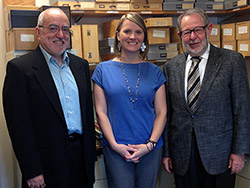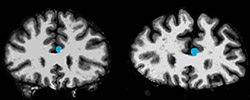
In 2012, scientists at Feinberg’s Cognitive Neurology and Alzheimer’s Disease Center (CNADC) captured national attention by identifying for the first time a group of people over 80 with remarkable, age-defying memory power. Now, the same scientists have received a five-year, $2.28 million National Institutes of Health (NIH) grant to continue studying these “SuperAgers” to find out how they resist cognitive decline.
“This project started as proof of concept. We wanted to know if it was possible to find individuals with unusually superb memory performance for their age,” said Emily J Rogalski, ’07 PhD, research associate professor at the CNADC and one of the principal investigators of the study. “So far we have shown that not only is it possible, but there are also some biologically interesting things about these individuals’ brains.”
Memory loss is one of the most common complaints from older adults. At the same time, age is the biggest risk factor for Alzheimer’s disease. By studying people in their 80s and 90s who score very well on memory tests – at least as well or even better than individuals in their 50s and 60s – the scientists hope to find clues to help treat patients with Alzheimer’s disease and other types of dementia.
“We want to know what these cognitively healthy individuals have in common – biologically, psychosocially and genetically,” said Rogalski. “The goal is to identify modifiable factors that we can share with others.”

In an earlier study, Rogalski’s team found physical and genetic differences between 12 SuperAgers and normal agers, including a thicker cortex and less of a protein associated with Alzheimer’s disease risk. In the next iteration of this research, funded by the NIH’s National Institute on Aging, the scientists will follow a larger cohort – so far there are about 60 participants – for the rest of their lives. Most have already agreed to donate their brains after death, too.
All participants undergo standardized neuropsychological and neurological evaluations and brain scans. The scientists will also look for connections between memory power and other variables, including additional cognitive abilities, such as IQ score, and lifestyle factors, such as physical health. But early observations indicate that not all Superagers are highly educated, nor in top physical health.
“The goal is to use the data that we collect to launch new ideas about how we might approach aging and Alzheimer’s disease,” said Rogalski. “How can this data propel us toward the idea of living long and living well, rather than just living long?”
M. Marsel Mesulam, MD, Ruth Dunbar Davee Professor in Neuroscience and director of the CNADC, and Changiz Geula, PhD, research professor at the CNADC, are also principal investigators of this study, supported by NIH grant R01 AG045571-01.






